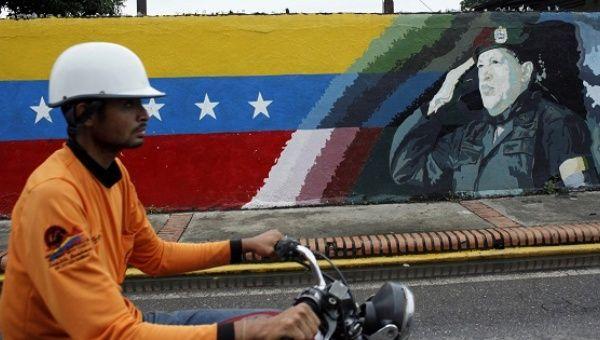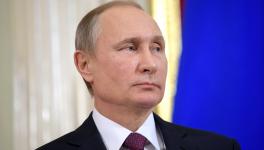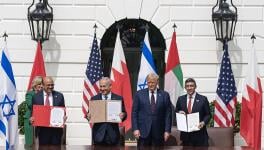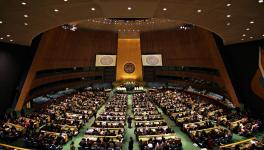Interventionist Moves Against Venezuela Fail Again at OAS Meeting

Image Courtesy: Reuters
Two opposing resolutions submitted at the Organization of American States to discuss the situation in Venezuela prior to its annual meeting has again led to the failure of interventionist moves by U.S.-backed forces, as both proposals put forth did not receive the two-thirds majority needed to pass.
Hours before the meeting scheduled for 2 p.m., local time, Peru withdrew a draft resolution on the country Monday shortly before foreign ministers were set to meet to discuss the political situation in Venezuela in hopes of adopting a resolution on the issue. The proposal put forward by Peru, Canada, the United States, Mexico and Panama and supported by other countries, called for the government of President Nicolas Maduro to be condemned and attempted to put a stop the National Constituent Assembly to rewrite the Venezuelan Constitution.
The so-called "compromise" proposal created confusion among member states, with various representatives questioning the process and expressing opposition to the move. Backed by the U.S. and based on the withdrawn Peruvian proposal, it received 20 yes votes, 8 abstentions, 5 no votes, while Venezuela, who refused to recognize the proceedings, was counted as absent.
A second counterproposal put forward by the 14 countries of the Caribbean Community known as Caricom, called for an "internal" solution "based on dialogue" and rejected potential international intervention.
However various countries including Saint Vincent and the Grenadines, Dominica, Suriname, and Haiti expressed dismay, signaling that they were neither consulted on the new motion nor were informed about the retraction of the Caricom submission.
Saint Vincent resubmitted the CARICOM proposal on its own, and that proposal received 8 yes votes, 11 abstentions, 14 no votes and again Venezuela registered as absent.
Several countries including Ecuador, Bolivia, Nicaragua, and El Salvador expressed concerns about attempts to target Venezuela through the OAS.
The meeting on foreign ministers came ahead of the inauguration of the OAS General Assembly at 7:00 p.m. local time in the coastal city of Cancun. The meeting is scheduled to run until Wednesday.
Venezuela, which stated it would not recognize any motion passed by the OAS against it, has criticized the OAS and its Secretary-General Luis Almagro for attempting to meddle in the country's politics and justify international intervention.
For measures condemning Venezuela to be accepted, sponsors of the proposal including Mexico and the United States needed to win the support of Caribbean countries, most of which have traditionally been allies of Venezuela since Hugo Chavez was president.
Rather than backing the resolution condemning Venezuela, most Caribbean nations called for an end to violence and urged both sides of the political divide to begin a new dialogue process. This is in keeping with the government of Venezuela's attempts to confront the violent protests called by the opposition that have left at least 84 people dead since they began in early April. The opposition is divided in accepting the call for a dialogue, a process that has received the support of Pope Francis and the Vatican as well as former presidents of the region.
This assembly comes after the first meeting of foreign ministers in Washington on May 31 to discuss Venezuela was suspended due to lack of consensus. A consensus needs to be agreed upon with at least 23 of the 34 members, about two-thirds of the countries. Cuba is not counted as it is no longer a member.
Social movements from Mexico and Venezuela organized several marches and events Sunday to show support for the South American nation and reject potential intervention.
Ahead of the start of the meeting, Venezuelan Foreign Minister Delcy Rodriguez accused Almagro and Mexican Foreign Minister Luis Videgaray for being complicit in verbal attacks against Venezuelan delegates visiting Mexico, including Ambassador Carmen Velasquez and Deputy Foreign Minister Samuel Moncada.
"I hold @Almagro_OEA2015 and @LVidegaray directly responsible for the physical integrity of our diplomats according to international law," Rodriguez said on her Twitter account.
Videgaray responded by saying that such verbal attacks took place in a "free country" outside the hotel where many people had come "by their own volition."
Videgaray and Rodriguez have criticized each other for the past weeks after the Mexican diplomat said Venezuela was not a democracy and voiced support for the opposition in their plans to block the National Constituent Assembly.
Moncada also accused the Mexican government of being an "accomplice" of the "verbal attacks" and "physical threats" that he received outside the hotel where the Venezuela delegation was staying.
Rodriguez said ahead of the meeting in a video posted on her Facebook page that Venezuelan has put forward 10 draft resolutions to be considered at the annual meeting, including motions rejecting U.S. President Donald Trump's border wall, Washington's withdrawal from the Paris climate agreement and other issues.
She has said the procedure for Venezuela to leave the OAS, which the country began on April 27, will continue since it takes two years for a country to withdraw from the organization.
"Neither the OAS nor Luis Almagro nor the right wing of the region encouraged by the United States will win against sovereign Venezuela!" the foreign minister said on her Twitter account.
The statement was made after Almagro said that Venezuela's Interior Minister Nestor Reverol, and the head of the Bolivarian National Guard, Antonio Benavides Torres, were "responsible for very serious violations of human rights." Almagro's comments have triggered rejection from several Latin American countries.
Almagro continued his controversial statements on Venezuela Monday ahead of the start of the OAS meeting, saying that Venezuela is suffering a constitutional crisis.
Disclaimer: The views expressed here are the author's personal views, and do not necessarily represent the views of Newsclick.
Get the latest reports & analysis with people's perspective on Protests, movements & deep analytical videos, discussions of the current affairs in your Telegram app. Subscribe to NewsClick's Telegram channel & get Real-Time updates on stories, as they get published on our website.
























